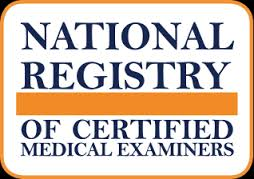[contact-form][contact-field label=’Name’ type=’name’ required=’1’/][contact-field label=’Email’ type=’email’ required=’1’/][contact-field label=’Website’ type=’url’/][contact-field label=’Comment’ type=’textarea’ required=’1’/][/contact-form] Preparing for a DOT Medical Exam (again)
It’s time to revisit preparing for your DOT Physical since many of the drivers are now getting their one year follow-up DOT Exam and this information is important to make sure your DOT Physical goes smoothly. (Helpful Tips)
According to the Federal Motor Carrier Safety Administration (FMCSA), the purpose of the DOT exam is to detect the presence of physical or mental conditions which affect the ability of the driver to operate a commercial motor vehicle (CMV) safely. The exam balances the driver’s right to work versus the right of the public to drive on safe roads. In that regard, the DOT Certified Medical Examiner will focus on health issues that increase the risk of gradual or sudden incapacitation while driving a CMV. As a DOT driver, your role is to assist the medical examiner by providing accurate and comprehensive information about your general state of health.
Since much hinges on the outcome of your DOT exam, it is in your best interest to prepare for your exam ahead of time. Below is a list of DOs and DON’Ts that should help you:
- At least a week before your DOT exam, if you have certain medical conditions, you should gather documentation for the examiner to review. Here are some examples: If there are any questions CALL your medical examiner. (CONTACT US)
Diabetes: You should bring along a copy of your most recent (within six months) hemoglobin A1c blood test. It is also helpful to bring a note from the healthcare provider who treats your diabetes. The note should include:
- List of medications;
- Any severe hypoglycemic reactions in the last year;
iii. Any complications from your diabetes (heart, kidney, vision, nerves);
- An assessment of whether your diabetes will interfere with your ability to drive a CMV safely.
Note: diabetics using insulin are disqualified, however, you may be eligible for a Federal Exemption or a State Waiver (a State Waiver allows you to drive a CMV only within the borders of that state).
Sleep apnea: With mild sleep apnea, treatment is optional; however, you should bring a copy of the sleep study that shows you have mild sleep apnea. With moderate or severe sleep apnea, treatment is mandatory. The most common treatment is CPAP. If you use a CPAP machine, the machine’s computer records CPAP usage. You should contact the company that services your machine and get a printout of your CPAP usage. The data should cover a period of at least three months. FMCSA Medical Guidelines require the following minimal CPAP usage: 70% of the nights for at least 4 hours per night. If you treat your sleep apnea with something other than CPAP, you will need to bring documentation (usually a sleep study) showing that your treatment is effective.
Heart: If you have a history of heart attack, angina, angioplasty, or cardiac bypass surgery, you will need a note from your cardiologist stating that your cardiac condition will not interfere with your ability to operate a CMV safely. You will also need to provide exercise stress test results as follows:
- Drivers with a history of heart attack, angina, or angioplasty must have an exercise stress test every two years.
- Drivers who have undergone cardiac bypass surgery, beginning five years after the surgery, will have to undergo exercise stress testing every year.
Hypertension (high blood pressure): FMCSA Regulations require your blood pressure to be 140/90 or less to receive a one-year DOT card. Many drivers are anxious while undergoing a DOT exam in an unfamiliar medical office. As a result, their blood pressures tend to be higher than normal. If you fall into this category, it may be helpful to bring in recent blood pressure readings from your personal healthcare provider.
Blood thinners: If you take the blood thinner Coumadin (warfarin), you should provide a copy of your most recent INR blood test results. The medical examiner may also require a note from your healthcare provider regarding the condition for which you are prescribed the blood thinner (for example, atrial fibrillation, blood clot).
Psychiatric conditions: Psychiatric disorders are often treated with potent medications which have significant side effects such as drowsiness. If you are under treatment for a psychiatric condition with medication, it would be useful to provide a note from your treating healthcare provider. The note should state that neither your psychiatric condition nor your medication will interfere with your ability to drive a CMV safely.
- Make a list of all your medications, prescription and over-the-counter. Be sure to include the dosages.
- Make a list of all the healthcare providers involved in your physical and mental health. In addition to physicians, you should include nurse practitioners, physician assistants, chiropractors, therapists, social workers, etc. Don’t forget to include their phone numbers. You or the examiner may need to contact one or more of these individuals.
- Be sure to get a good night’s sleep. If you arrive for your DOT exam in a fatigued state, it may affect your health, especially your blood pressure.
- The morning of your DOT exam, take all your medications as usual. This is particularly important for individuals with diabetes and hypertension. Missing even one dose of your blood pressure medicine may result in significantly elevated blood pressure during your DOT exam.
- Do not eat a big meal before your DOT exam. This is especially important for diabetics. A urine test (urinalysis) is part of the DOT exam. A large meal may lead to the spilling of sugar into your urine resulting in an abnormal urinalysis.
- Avoid stimulants. These include coffee, tea, caffeinated soda, energy drinks, and certain cold and allergy medications. Stimulants often have the undesirable side effects of raising your blood pressure and speeding up your heart rate.
- Avoid salty foods. Excess sodium tends to elevate one’s blood pressure.
- As part of your DOT exam, you will have to pass an eye test. FMCSA Regulations require your distance vision to be 20/40 or better in each eye separately. If you wear eyeglasses for distance, be sure to bring them to your appointment. Similarly, contact lens wearers should arrive with their lenses in.
- Drink plenty of cold water. As part of your DOT exam, you will need to provide a urine specimen. Arrive at the medical examiner’s office well hydrated. You don’t want to have to hang around waiting to produce an adequate quantity of urine. Cold water has the added benefit of lowering your blood pressure.
- Allow plenty of time to get to your DOT exam appointment. If you rush around and get stressed out, your blood pressure and heart rate may go up.
- Upon arrival for your DOT exam appointment, you will be required to complete page one of the Medical Examination Report which includes Driver’s Information and Health History. Fill out this paperwork as completely and truthfully as possible. Omitting important medical information has negative consequences. In these days of electronic medical records, you would be surprised how much medical data can be cross-referenced. Any fraud in completing your DOT paperwork may be reported directly to FMCSA and may result in a fine and loss of DOT driving privileges.
- Many medical offices get backed up during the course of a busy day. If you want your wait, if any, to be minimal, schedule the first appointment of the day. Otherwise, expect delays and don’t let it stress you out. Relax, take deep breaths, think happy thoughts, read a book or magazine, and drink cold water. Letting stress get to you will serve no useful purpose; it may only raise your blood pressure and heart rate.
The purpose of the DOT exam is not to punish but to promote safety. Following the common sense steps listed above and maintaining a positive attitude will go a long way toward making your DOT exam a more pleasant experience.
By Dr. Michael Tigges





